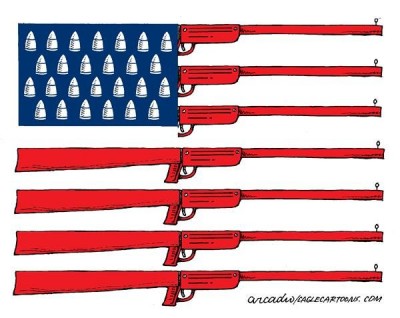The Silence of the Law: The Charleston Church Gunman

Arguments about guns in the United States resemble forays into
intense religious debate. They are doctrinal issues (the “right” to
bear arms; the entitlement to protection) that chatter through the
various lobbies. There are purely quibbling legal issues (what
regulations are appropriate in terms of controlling access to guns).
There are the broader ethical issues (should people even have guns as a
principle to begin with?)
Those left behind in such debates tend to be the silent corpses,
littered collateral damage in a rights culture that hyperventilates with
each urban massacre. Fascinatingly, none of these mass killings ever
qualifies as a terrorist onslaught, even if inflicted by a person with a
dog-breakfast ideology.
A theme that has recently emerged about whether Dylann Roof’s conduct
prior to the deeds he is charged
with is that of regulation. This is
the procedural part of the debate, showing a range of attitudes to the
law on guns. How did Roof obtain the weapon that led to the deaths of
nine people at the Emanuel African Methodist Episcopal Church, including
its senior pastor?
As if picking up scraps in desperation, a stream of commentary has
emerged: Roof, it transpires, had been arrested in late February at a
Columbia shopping mall, and subsequently charged with possessing
Suboxone. He was then indicted by a Lexington County grand jury. The
case has yet to conclude.
Hence the battle of the laws, armed, metaphorically, for a clash.
South Carolina law deems Roof’s drug charge a misdemeanour. The
designation is significant, as such misdemeanours do not disentitle one
from obtaining a gun. Federal law, however, spoils the party,
prohibiting the sale of a gun to anyone “under indictment” for a felony.
It also has an additional proscription against sales to anyone deemed
“an unlawful user” of controlled substances.
Officials of the Bureau of Alcohol, Tobacco, Firearms and Explosives,
at least by their opinions, have given the green light in the case –
Roof obtained his gun lawfully.[1] More to the point, he was entitled.
Kevin D. Williamson of the National Review Online was
positively chuckling with delight. The law had worked. Those
“political ghouls of the Left” had swooped in after the “horrific
massacre” wanting another “gun-control fight”. Instead, they hit a legal
cul-de-sac, “since the killer acquired his gun after passing precisely
the sort of background check that the Left generally hawks after a
high-profile crime, regardless of whether it is relevant to the crime.”[2]
Always conspicuous is how such commentary places the law outside its
cultural frame. Law is the holy word, scripted. It biblically animated,
the New World remake. This is supposedly civilisation take two.
Everything is done within it. Except, of course, when people get
slaughtered. That is when the law suffers its terrible silence. All
sides of the gun-control debate suffer before this phenomenon of silent
laws.
Each massacre brings with it a discussion about sacred rights and
sacred entitlements, citing inadequate laws and inadequate protections.
Guns are always the delivery packages for those who believe in rights,
just as they remain the target of those who also believe in their
control. To that end, Roof’s battles are writ large, on a broader
racial and political canvass which presupposes the most extreme form of
dispute resolution. This is the US at war with itself.
His supposed “manifesto”, should it even qualify as that, seeks to
bring the revolution home, forging into the ghettoes with the
apocalyptic enthusiasm of the four horse men.[3]
“The first website I came across was the Council of Conservative
Citizens. There were pages upon pages of these brutal black on White
murders.”
For the author, this is another form of legal silence, one which
tolerates the ascendancy of other races even as whites fall into
oblivion. All that fuss about the killing of Trayvon Martin was an alibi
for a broader American problem. “How could the news be blowing up the
Trayvon Martin case while hundreds of these black on White murders got
ignored?”
The manifesto does not swirl with brazen lunacy so much as a revenge
undertaking about what the country has become. This is the old theme:
America as an idea. That idea, according to Scott Timberg (Salon, Jun
24), “is a kind of distorted, funhouse-mirror reflection of
Tea-Party-era conservative white America’s core beliefs”.[4] And to remake that idea, one needs weapons.
Gun control advocates tend to want to take away the syringes from the
patient and lock up the substances in inaccessible places. The sickness
of that patient is ignored. Gun ownership in other countries (Canada,
Switzerland) is staggeringly high without the need for manifest urban
warfare. The law, in short, is always deemed silent when perceived
rights are ignored. But it is the mechanism of culture, its generation,
its excuses, it lamentations, that encase the law with meaning. Weep,
mourn, and expect the next massacre.
Notes
[1] http://www.nbcnews.com/
No hay comentarios:
Publicar un comentario